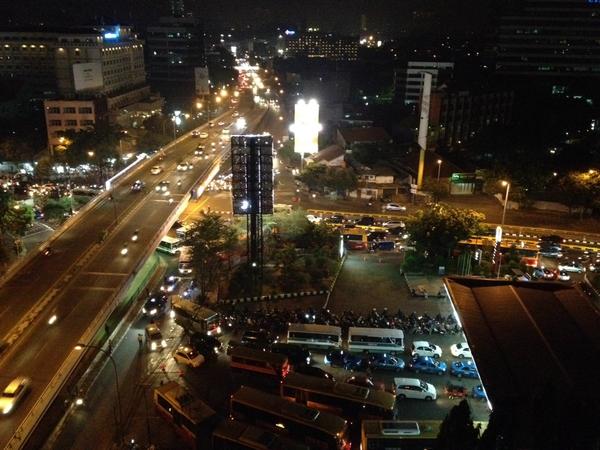Berita Terkait
- Anggaran DPR RI Tahun 2016-2018
- Kehadiran Anggota DPR Pada Masa Sidang Ke-2 Tahun 2017-2018
- Review Kinerja DPR-RI Masa Sidang ke-2 Tahun 2017-2018
- Fokus DPR Masa Sidang ke-3 Thn 2017-2018
- Konsentrasi DPR Terhadap Fungsinya Pada Masa Sidang ke - 3 Tahun 2017 – 2018
- Kehadiran Anggota DPR RI Masa Sidang ke-3 Tahun 2017-2018
- Review Kinerja Masa Sidang Ke-3 Tahun 2017-2018
- Konsentrasi DPR Terhadap Fungsinya Pada Masa Sidang ke - 4 Tahun 2017– 2018
- Peristiwa Menarik Masa Sidang ke-4 Tahun 2017-2018 (Bidang Legislasi)
- Peristiwa Menarik Masa Sidang ke-4 Tahun 2017-2018 (Bidang Pengawasan)
- Peristiwa Menarik Masa Sidang ke-4 Tahun 2017-2018 (Bidang Keuangan, Lainnya)
- Review Kinerja DPR-RI Masa Sidang ke-4 Tahun 2017-2018
- (Tempo.co) Kasus Patrialis Akbar, KPPU: UU Peternakan Sarat Kepentingan
- (Tempo.co) Ini Proyek-proyek yang Disepakati Jokowi-PM Shinzo Abe
- (Tempo.co) RUU Pemilu, Ambang Batas Capres Dinilai Inkonstitusional
- (Media Indonesia) Peniadaan Ambang Batas Paling Adil
- (DetikNews) Besok Dirjen Pajak Panggil Google
- (Tempo.co) Aturan Komite Sekolah, Menteri Pendidikan: Bukan Mewajibkan Pungutan
- (Rakyat Merdeka) DPR BOLEH INTERVENSI KASUS HUKUM
- (Aktual.com) Sodorkan 4.000 Pulau ke Asing, Kenapa Pemerintah Tidak Menjaga Kedaulatan NKRI?
- (RimaNews) Pimpinan MPR dan DPR akan bertambah dua orang
- (Warta Ekonomi) Jonan Usulkan Kepada Kemenkeu Bea Ekspor Konsentrat 10 Persen
- (Tempo.co) Eko Patrio Dipanggil Polisi, Sebut Bom Panci Pengalihan Isu?
- (TigaPilarNews) DPR Harap Pemerintah Ajukan Banyak Obyek Baru untuk Cukai
- (Tempo.co) Menteri Nasir: Jumlah Jurnal Ilmiah Internasional Kita Meningkat
Kategori Berita
- News
- RUU Pilkada 2014
- MPR
- FollowDPR
- AirAsia QZ8501
- BBM & ESDM
- Polri-KPK
- APBN
- Freeport
- Prolegnas
- Konflik Golkar Kubu Ical-Agung Laksono
- ISIS
- Rangkuman
- TVRI-RRI
- RUU Tembakau
- PSSI
- Luar Negeri
- Olah Raga
- Keuangan & Perbankan
- Sosial
- Teknologi
- Desa
- Otonomi Daerah
- Paripurna
- Kode Etik & Kehormatan
- Budaya Film Seni
- BUMN
- Pendidikan
- Hukum
- Kesehatan
- RUU Larangan Minuman Beralkohol
- Pilkada Serentak
- Lingkungan Hidup
- Pangan
- Infrastruktur
- Kehutanan
- Pemerintah
- Ekonomi
- Pertanian & Perkebunan
- Transportasi & Perhubungan
- Pariwisata
- Agraria & Tata Ruang
- Reformasi Birokrasi
- RUU Prolegnas Prioritas 2015
- Tenaga Kerja
- Perikanan & Kelautan
- Investasi
- Pertahanan & Ketahanan
- Intelijen
- Komunikasi & Informatika
- Kepemiluan
- Kepolisian & Keamanan
- Kejaksaan & Pengadilan
- Pekerjaan Umum
- Perumahan Rakyat
- Meteorologi
- Perdagangan
- Perindustrian & Standarisasi Nasional
- Koperasi & UKM
- Agama
- Pemberdayaan Perempuan & Perlindungan Anak
- Kependudukan & Demografi
- Ekonomi Kreatif
- Perpustakaan
- Kinerja DPR
- Infografis
(WSJ) For Taxi Driver, It’s Not Just Fuel That Will Be More Expensive

The increase in the price of subsidized fuel drew crowds out to fuel stations across Indonesia and raised concerns that knock-on inflation will make staple goods more expensive.
“The price of groceries will increase, the price of rice will go up. Chili, how much more will that be?” asked Kamil Udin, a taxi driver who was listening to the announcement on his car radio hours before the hikes took effect at midnight Monday.
The government has promised to make cash assistance available to millions of the country’s poorest to cushion the impact of the fuel-price increase. Gasoline rose to 8,500 rupiah a liter from 6,500 rupiah, while diesel fuel increased to 7,500 rupiah a liter from 5,500 rupiah.
Reducing the amount of money that goes to keep fuel cheap will free up about $8 billion in budgetary funds for other programs. Mr. Widodo has repeatedly said he will put the savings toward improving health care, education and infrastructure.
But Mr. Udin said he worries that higher prices will make life harder.
“Education is already free, health care is free. But if the price of fuel goes up, our daily goods will be more expensive,” he said. “Where will I get (the money)?”
The move will impact not just the price of fuel but also nearly everything that needs transportation to move to market. Inflation currently stands at less than 5% but economists say prices will rise to around 7.5% year on year by the end of the year, a sharp increase.
Analysts have long called on the government to reduce the amount of money it spends on keeping fuel prices low, in large part to ease pressure on the budget deficit and reallocate the money to more productive projects, such as infrastructure development.
But citizens worry that they won’t see the benefits of subsidy reallocations and instead will have the added burden of paying more for daily needs. It’s low-income Indonesians who say they’re most impacted by fuel price increases, which have sparked protests in the past. Officials and economists argue, however, that it’s often the rising middle and upper class who benefit the most from cheap gas, which they use to fuel their cars and motorbikes.
As has happened with previous price hikes, people rushed to gas stations to fill up their tanks before the new price went into effect at midnight and many posted updates and pictures of the queues into their social media feeds. Shortly after news of the price increase began circulating the hashtag #BBMNaik, which refers to the fuel price increase, became the top trending topic worldwide on Twitter.
President Joko Widodo began talking about raises prices even before he was inaugurated last month, despite signals of how unpopular the move might be. According to a public opinion poll conducted in August, more than 70% of respondents said Mr. Widodo should not raise fuel prices within six months of taking office.
A one-time furniture exporter who won widespread support as governor of Jakarta for what are deemed his “people-centric” policies, President Joko Widodo said then that he would risk being unpopular.
– Sara Schonhardt, with Ben Otto contributed reporting.